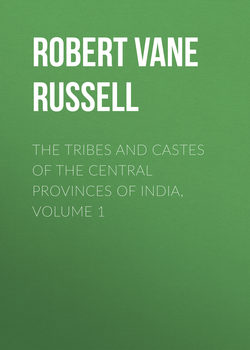Читать книгу The Tribes and Castes of the Central Provinces of India, Volume 1 - Robert Vane Russell - Страница 34
Part I.
Introductory Essay on Caste
Introductory Essay on Caste
31. Status of the village menials
ОглавлениеThe castes of village and household menials form a large group between the cultivators on the one hand and the impure and servile labourers on the other. Their status is not exactly the same. On the one hand, the Nai or barber, the Kahār and Dhīmar or watermen, the household servants, the Bāri, Ahīr, and others, some of the village priests and the gardening castes, are considered ceremonially pure and Brāhmans will take water from them. But this is a matter of convenience, as, if they were not so held pure, they would be quite useless in the household. Several of these castes, as the Dhīmars, Bāris and others, are derived from the primitive tribes. Sir H. Risley considered the Bāris of Bengal as probably an offshoot from the Bhuiya or Mūsahar tribe: “He still associates with the Bhuiyas at times, and if the demand for leaf-plates and cups is greater than he can cope with himself, he gets them secretly made up by his ruder kinsfolk and passes them off as his own production. Instances of this sort, in which a non-Aryan or mixed group is promoted on grounds of necessity or convenience to a higher status than their antecedents would entitle them to claim, are not unknown in other castes, and must have occurred frequently in outlying parts of the country, where the Aryan settlements were scanty and imperfectly supplied with the social apparatus demanded by the theory of ceremonial purity. Thus the undoubtedly non-Aryan Bhuiyas have in parts of Chota Nāgpur been recognised as Jal-Acharani (able to give water to the higher castes) and it may be conjectured that the Kahārs themselves only attained this privilege in virtue of their employment as palanquin-bearers.”67 The fact that Brāhmans will take water from these castes does not in any way place them on a level with the cultivators; they remain menial servants, ranking, if anything, below such castes as Lohār, Teli and Kalār, from whom Brāhmans will not take water; but these latter are, as corporate bodies, more important and prosperous than the household menial castes, because their occupation confers a greater dignity and independence.
On the other hand, one or two of the village menials, such as the Dhobi or washerman, are considered to some extent impure. This is due to specially degrading incidents attaching to their occupation, as in the case of the Dhobi, the washing of the clothes of women in childbirth.68 And the Sungaria subcaste of Kumhārs, who keep pigs, are not touched, because the impurity of the animal is necessarily communicated to its owner’s house and person. Still, in the village society there is little real difference between the position of these castes and those of the other village menials.
67
Tribes and Castes of Bengal, art. Bāri.
68
Pointed out by Mr. Crooke.
